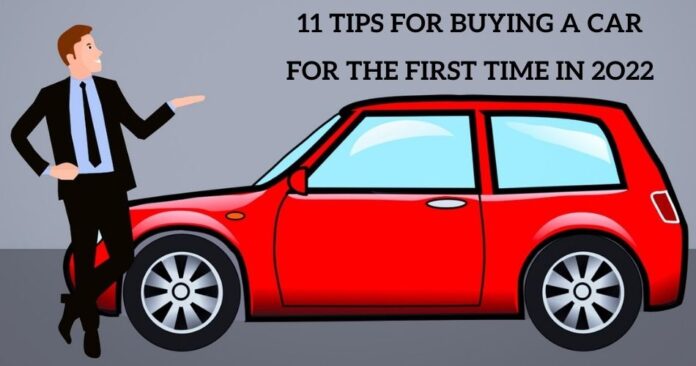Searching Tips for Buying a Car for the First time? We got you covered.
There are many things to know when buying a car for the first time, whether you’re buying a used car or from a dealership. For example, did you know that most new cars lose 20% of their value as soon as you drive them off the lot? Or that financing through the dealer typically costs twice as much as getting pre-approved financing from your bank?
Whether you’re looking to buy or lease, these 11 tips will help you get the most out of your car purchase and avoid any costly mistakes.
Top 11 Tips for Buying a Car for the First time in 2022
1) Set a Budget
Set your budget before you start looking at cars. There are several ways to set a budget: by using an online financial calculator or by using tools like Edmunds and TrueCar to get an estimate of what other people are paying for vehicles in your area. This information can be particularly helpful if you’re planning on buying used because it gives you an idea of what’s in line with what others are paying.

It might also help you learn how to get approved for financing faster. If possible, try to set aside some cash upfront—at least enough money to cover all of your down payment plus any vehicle registration fees and sales tax that comes with buying your car.
2) Start with What You Want
If you’re buying your first car and not sure what you want, start with what you don’t want.
Answer these questions:
What kind of fuel do I not want to deal with? (e.g., diesel, hybrid)
What’s my top speed limit on highways?
Where am I parking most often?
Are there any features I’m itching to have?
Do I need air-conditioning in my vehicle or can it get by without it?
These factors will help narrow down which vehicles might be best suited for your lifestyle and needs. Once you’ve got some options, consider personalizing your car shopping experience. Here are some ways to stand out as a buyer
3) Research Which Features Are Best
The most important thing to do when buying a car is to understand what you need in your vehicle. Because of an increasing number of features, options and models, it’s easy to get overwhelmed. Research which features are best so that you can keep your options open.
For example, if fuel economy is key, prioritize those vehicles first. Knowing what you want will help narrow down your decision-making process while ensuring that you don’t spend money on features that aren’t must-haves.

Researching your options will also give you information on what makes certain models more expensive than others. Manufacturers are constantly adding features to their vehicles, and if you want something with certain features, like a premium audio system or an all-wheel-drive option, then it’s likely that you’ll need to spend more.
Look at what sets each model apart from others so that you can make informed decisions about your budget and which cars are most worth your money.
It’s easy to get enticed by salespeople who try to pressure you into buying a car. Salespeople have quotas they need to meet, so they’re trained to sell as many cars as possible, even if those cars aren’t right for you.
4) How Much Do You Need?
It’s easy to go overboard when it comes to your budget, but don’t lose sight of what you can actually afford. Don’t buy more cars than you can afford. The last thing you want is to be unable to make your payments and find yourself with an upside-down car (i.e., owing more on it than its worth).
A good rule of thumb is that you should never finance more than 80% of your vehicle’s worth; if you pay cash, try not to spend more than 30% or so on a down payment. You’ll need some equity in order to sell or trade-in later, anyway—so make sure not to blow your money early.
5) Don’t Stress Out Over Negotiating Price
Unless you’re buying a vehicle from someone you know really well, such as a family member or close friend, and can trust that they’re being honest about its condition and needs, don’t expect to get a good deal. If anything, be prepared to pay more than you expect to. Remember: Cars are expensive!
Save your energy for negotiating other things that are more important, such as financing and extended warranties. And don’t let yourself get caught up in seller hype or enticed by special promotional deals. This can lead to paying more than you need to, so be careful not to fall into these traps.
If anything, always have an exit strategy so you can walk away if they won’t meet your conditions. At least then you won’t feel pressured into accepting a bad deal just because you want to buy right away.
6) Know How Long To Shop Around For A Car
Once you know what kind of car you’re looking for, take some time to research different makes and models. Even if you’re anxious to make a purchase, it’s important not to be too quick in your decision. Look at used cars just as much as new ones; there are many great deals on lightly-used vehicles that can save you thousands of dollars.
And keep in mind that price isn’t everything – it might not be worth spending extra money on features that you don’t care about or will never use. By doing a thorough research and shopping around carefully, purchasing a car is easy when compared with buying a home!
7) Don’t Buy Something You Can’t Afford
Car dealerships often offer financing options to help you make your monthly payments. Don’t be afraid to take advantage of these—just make sure that your interest rate isn’t too high or that you don’t end up with an extended period of time before you can pay off your loan.
If you decide not to take out financing, make sure you have enough cash on hand to pay for all parts of your car purchase without tapping into credit cards, which can have high-interest rates and other negative consequences if used improperly. Don’t forget about checking with banks, as well; many banks offer low-interest loans in order to get new customers.
8) Determine If It’s A Good Deal

One of the most important things to do before you enter into any sort of car-purchasing agreement is to determine whether or not you’re getting a good deal. To do that, look at comparable cars that are being sold by others in your area. The best places to find these types of comparisons are on websites like Edmunds, TrueCar and Kelley Blue Book.
When comparing vehicles, there are several different criteria you should use to compare them fairly: mileage, equipment (both standard and optional), financing terms, price and colour. The only time it’s fair to ignore these factors is if you’re buying directly from an individual seller who won’t budge on price — but even then, looking at ads can help you understand what other people think they’re selling their cars for.
9) Look Into Financing Options
Before you even start looking at new cars, it’s smart to do some research on financing. Auto financing can be tricky. Once you have your credit approved, you can search around for interest rates and perks offered by various car dealerships. When it comes time to get behind that wheel of a new (or new-to-you) ride, you’ll know exactly what your monthly payments will look like.

This lets you make an informed decision before buying, so there are no surprises down the road. Before choosing one dealership over another based solely on price, remember that cheaper doesn’t always mean better in-car shopping—and if something seems too good to be true, it probably is!
10) Check Car Insurance Policies
Your car insurance rate depends on many factors, including where you live, your driving record and gender. Start by checking your current policy, as well as those of other people in your household. Get quotes from at least three different companies to get an idea of how prices compare. If you’re switching vehicles (or moving to a new state), it may be wise to cancel your old policy first.
Read these articles for insurance tips:
Best Car Insurance for young adults
Explore Free Quotes for Automobile Insurance in 2022
11) Get Pre-Approved Before You Shop
When you go to buy a car, you should always get pre-approved so that you know exactly how much money you can spend. You’ll have time to look around and figure out what kinds of cars fit your budget, which makes your shopping experience much more efficient and enjoyable. If you don’t do it beforehand, some dealerships will work with buyers on getting pre-approved, but don’t count on it.
Most car salespeople want to make as much money off of each sale as possible and won’t mind wasting your time if they think that gives them an advantage in closing a deal. Be smart about things—get pre-approved before you even start looking for cars.
Conclusion
These are the most tips for buying a car for the first time.
Before you start shopping, it’s important to have a budget in mind. Knowing how much you can spend will keep you from falling prey to impulse purchases and last-minute deals that could leave you with payments that are out of reach. And once you’ve set your budget, make sure to check whether the features you are looking for is available or not.
You should also check into your state’s laws around used and new car warranties so that if something goes wrong within a certain number of years after purchase, you won’t be left having to pay thousands of dollars out of pocket.





I want to buy a Mahindra Balero Pickup, 4*4 WD,Single Cab.